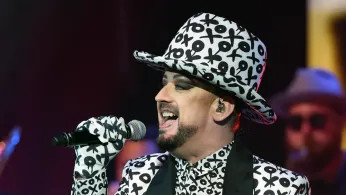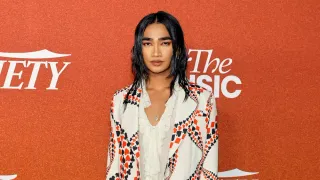
3 hours ago
Boy George Challenges Anti-Trans Rhetoric
READ TIME: 3 MIN.
British music legend Boy George has entered the spotlight once again—not for his iconic sound, but for his passionate advocacy on behalf of transgender people. The 64-year-old Culture Club frontman has recently engaged in a highly publicized social media exchange with Harry Potter author JK Rowling, centering on transgender rights and the responsibilities of public figures in shaping the discourse around gender identity .
The latest incident began after Rowling posted on X (formerly Twitter), questioning critics about “which rights have been taken away from trans people?”—a comment widely interpreted as a response to concerns raised by LGBTQ+ advocates about proposed changes to the UK's Equalities Act and the rights of transgender individuals. Boy George swiftly responded, stating: “The right to be left alone by a rich bored bully!” His remark was a direct rebuke of Rowling’s repeated commentary on gender identity and the preservation of women-only spaces, which has been condemned by many as transphobic .
The exchange quickly escalated, with Rowling firing back by referencing Boy George’s 2009 legal troubles. However, the singer remained firm in his stance, continuing to use his platform to challenge what he sees as harmful rhetoric and to advocate for the dignity and autonomy of transgender people .
In a recent interview segment, Boy George posed a pointed question to those opposed to transgender rights: “How many trans people have you met today?” This question, shared widely on social media and LGBTQ+ news outlets, underscores his argument that many critics of transgender rights lack direct, empathetic engagement with the community they discuss .
Further, during an appearance on ITV’s Lorraine, Boy George took the opportunity to dispel misinformation about transgender youth and to encourage audiences to view the conversation through a lens of kindness and factual understanding. He notably referred to Rowling as a “muggle” for her views—a pointed yet lighthearted critique referencing the Harry Potter universe and its themes of inclusivity and difference .
Boy George’s vocal support has been met with widespread appreciation from LGBTQ+ organizations and allies. Many see his comments as an important counterpoint to the prevailing narratives in UK media, where debates over gender identity often lack input from transgender individuals themselves or their advocates. LGBTQ+ groups have stressed the importance of public figures using their platforms to foster understanding and push back against misinformation, especially when those platforms reach global audiences.
Critics of Rowling's position argue that her insistence on defining womanhood strictly by biological sex undermines the rights and lived experiences of transgender people, particularly those seeking legal recognition and protection against discrimination. Boy George’s willingness to take a public stand, even at the risk of personal backlash, has been framed as an example of effective allyship—one rooted in empathy, lived experience, and a commitment to progress.
The exchange comes amid a broader climate of heated debate over gender identity in the UK, especially following the UK Supreme Court’s recent ruling that the terms “women” and “sex” in the Equalities Act refer to biological sex. LGBTQ+ advocates have expressed concern that such rulings may erode protections for transgender people, particularly in areas such as healthcare, education, and public accommodations .
Boy George’s advocacy also reflects ongoing efforts by LGBTQ+ leaders to center the voices and experiences of transgender people in public conversations. By challenging high-profile figures and urging the public to engage directly and empathetically with the community, he joins a growing movement working to combat stigma and ensure that the rights and dignity of transgender people are upheld.
As the debate continues, Boy George’s comments serve as a reminder of the power of celebrity voices in shaping public understanding—and the ongoing need for allyship in the fight for equality.






